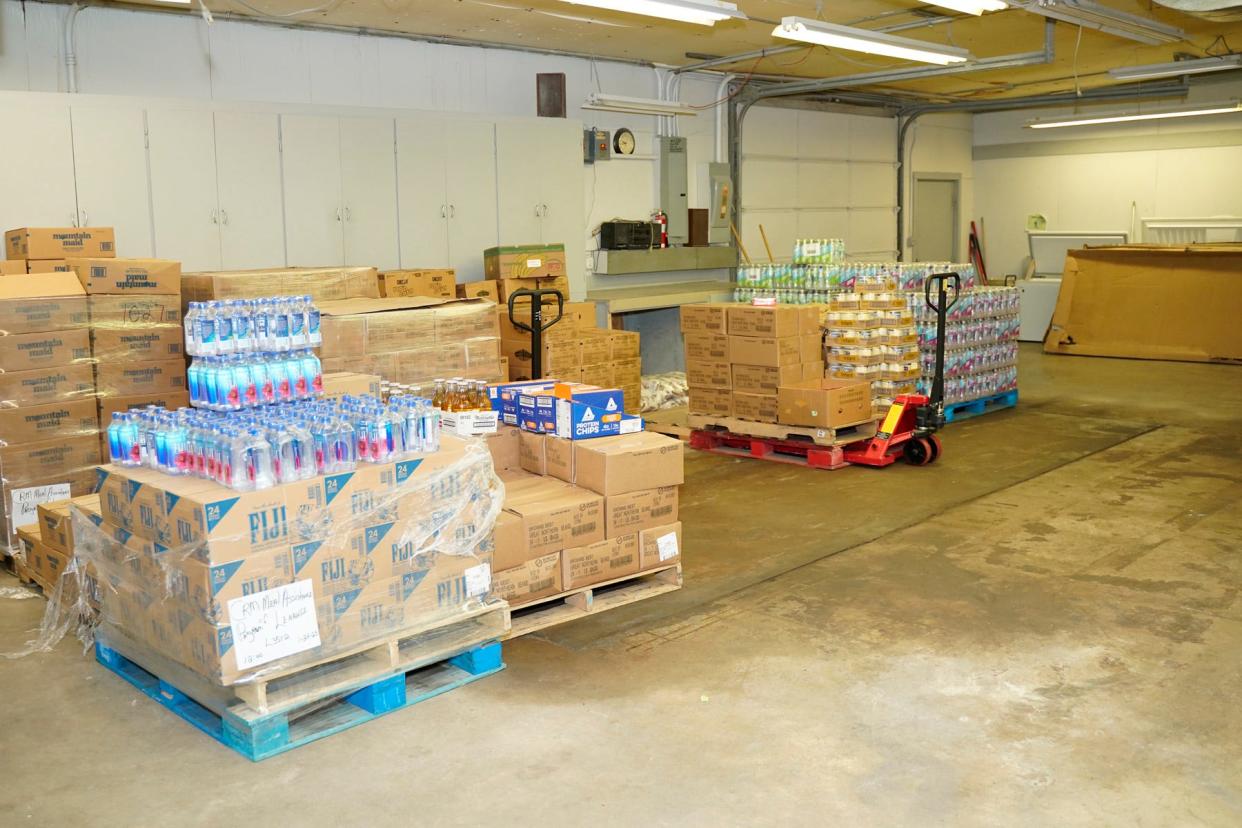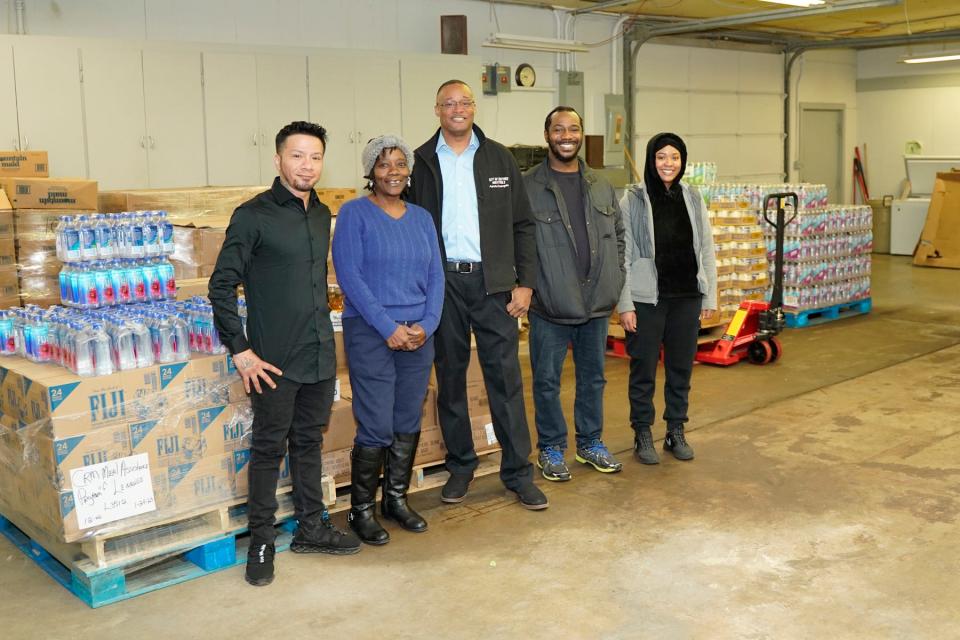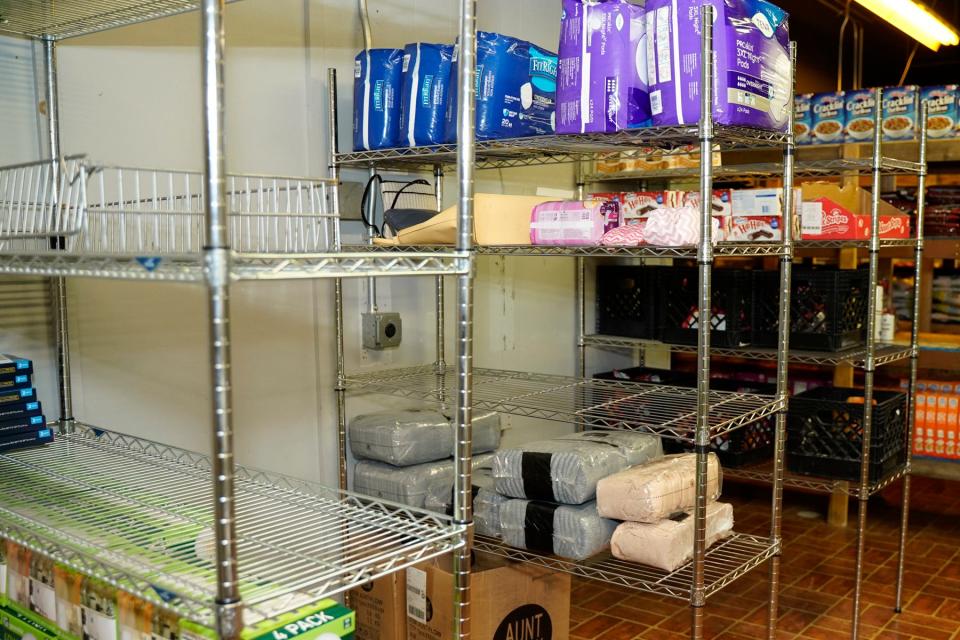Lenawee County food pantries seeing decrease in donations, increase in need

ADRIAN — Local food pantries are stretched thin and are having trouble meeting the needs of the hungry in Lenawee County. The problem is especially acute on the east side of Adrian.
“Food pantries play an important role in providing food assistance to individuals and families that are facing food insecurity throughout Lenawee County but specifically in the city of Adrian and even more specifically in that circle of what is considered to be the three-to five-mile radius of the most critical social determinants of health on the east side of Adrian,” Adrian Meijer store director Ben Negron said in an email. Many local food pantries purchase food through the store.
Negron is referring to last year’s Social Determinants of Health Study conducted by the ProMedica Charles and Virginia Hickman Hospital, which found that Adrian’s east side is the most centralized with the most severe need for food and other services in the county.
But this is not just an Adrian or Lenawee County problem. It affects vulnerable populations nationwide. The pandemic increased traffic at food pantries and now that most of the federal COVID-19 relief money has dried up, more are left hungry and vulnerable and are visiting their local food pantries to sustain themselves.
Inflation is also impacting the situation. More people are struggling to get by, and those who used to donate food and financial help to food pantries are having to cut back to meet their own needs.

A 2022 report by Feeding America found that in 2021, 53 million households relied on food banks. The number of households using food banks and food pantries is much more than pre-pandemic levels.
The City of Refuge Ministries Meal Assistance Program of Lenawee County in downtown Tecumseh also distributes food from the parking lots at St. Mary's Catholic Church in Adrian and Clinton United Methodist Church and provides food to local elementary schools, Siena Heights University and patients in need at the Family Medical Center in Adrian. City of Refuge also has an emergency needs program.
Through its regular pantry, fresh food distribution, school programs and partnership with the Family Medical Center, it serves more than 550 families monthly. Refuge’s food program has been operating since March 2020.
Refuge saw an uptick in need starting in October 2022. Prior to that, the program was serving about 350 to 450 families a month. The numbers are steadily increasing. Most of its family households typically house from three to five members.

“We do have concerns regarding the needs in our community. As awareness of our services grows, the need to access more food resources grows. We distribute quite a large number of pounds monthly and need to acquire large quantities of food monthly to keep up with demand. We have numerous supporters throughout community but need to grow our support base,” De’Angelo Boone, director of the City of Refuge Ministries Meal Assistance Program of Lenawee County and senior pastor of the City of Refuge Ministries International, said in an email.
The Refuge food program aids any resident of Lenawee County. The program is entirely funded through donations.
“Our primary resource for food comes from the South Michigan Food Bank. We are always seeking additional partners to ensure that we have the food resources to provide to our community. The food we provide is at a cost to us, but the cost is nominal. For $1 we are able to provide meals for over six families,” Boone said.
The South Michigan Food Bank is based in Battle Creek and serves Lenawee, Barry, Branch, Calhoun, Hillsdale, Jackson, Kalamazoo and St. Joseph counties. It is one of some 200 food banks across the nation. It serves more than 300 food pantries, soup kitchens and after-school backpack programs.
In Lenawee County, the South Michigan Food Bank partners with 13 food pantries, six fresh food distributions, two soup kitchens and a number of after-school programs, according to Heather Pearce, community impact coordinator for the South Michigan Food Bank, who added that she has seen an increase in demand at local pantries.
“Some pantries have had to adjust their hours to accommodate those in need. I have also had pantries reduce their hours because of demand. They are unable to keep their shelves stocked for financial reasons,” Pearce said in an email. “Our current economy is the leading factor. Families are choosing to pay their rent and utilities while using the food pantries as their grocery store.”
The food bank has a cost share of 19 cents per pound of food. It keeps its costs low with resources like the United States Department of Agriculture, donations and contracts with local farmers for fresh produce.
Other pantries and meal providers also report an increase in demand but a decrease in donations. The Salvation Army food pantry in downtown Adrian serves any resident in Lenawee County and sees an average of 60 to 80 families per month, which equates to about 250 people. Its fresh food distribution program used to see 300 families per week, but due to supply and demand issues it now gets 150 family boxes one time per month. The Salvation Army also serves between 160 and 250 meals a week and provides fresh produce to go.

“Since the beginning of the pandemic our numbers have increased. There were a few times that numbers went back down to pre-pandemic days, but they have consistently gone back up. We are finding that more and more often we are seeing families that have never had to ask for assistance before,” Salvation Army Capt. and pastor Laura Lunnam said in an email. “We have had difficulty keeping the shelves stocked as many of our donors have also been affected by the rising costs of living. We have also had a difficult time getting all that we need as supply has been down all over.”
The Salvation Army purchases food from the South Michigan Food Bank and local stores. The food bank has had a shortage of supply and the local stores have at times been short as well. The Salvation Army also gets food donations from local stores, local farmers and community members and those donations have decreased significantly along with financial donations, Lunnam said.

Inflation is having a double effect on food pantries, said Jim Southard, executive director of The Daily Bread of Lenawee in Adrian. Not only has inflation caused an increase in need among county residents, but the "overall cost of goods are rising and fuel surcharges are also being added, making food costs the highest I’ve ever seen," he said in an email.
"We have seen about a 25% uptick in Lenawee County families experiencing food insecurity ever since Covid-19 and now with the rapidly increasing food costs," he wrote.
"We understand that our residents on fixed incomes are struggling with rising costs," Southard wrote. "Some residents are being faced with making choices of forgoing necessary medications or paying rent vs. purchasing basic needs. We strive to help supplement basic needs to our patrons by providing food and toiletries to help alleviate the burden in their household budget, so they hopefully won’t have to sacrifice their health and wellbeing due to inability to pay for the things they need."
The Daily Bread, which offers free, hot meals from 11:30 a.m. to 2 p.m. Tuesday through Saturday at 302 S. Tecumseh St. in Adrian, gets its food supply from the South Michigan Food Bank, Meijer, Gordon Food Service and donations.
Fishes and Loaves Food Pantry in downtown Adrian is part of faith-based nonprofit Neighbors of Hope. Its executive director and pastor, Steven Palmer, said the pantry has seen about a 20% increase in demand since most COVID-19 relief funding has been spent.
Fishes and Loaves serves the Lenawee County area. Its eligibility requirements for re-occurring shoppers include being a Lenawee County resident and an income level not exceeding 180% of current low-income rates. It also provides emergency food relief to anyone in need, but this emergency food relief is for one-time needs. Fishes and Loaves is funded through donor dollars from the community.
Ninety-five percent of the food distributed through the pantry is donated from the community. The other 5% is purchased from the South Michigan Food Bank. Because Neighbors is a faith-based non-profit, it does not receive government funding, but there are a few grant resources it uses, including local foundation grants and the United Way’s Emergency Food and Shelter Program grant, Palmer said.
Palmer attributed the success of the Fishes and Loaves Food Pantry in keeping its shelves stocked and meeting the food needs of those who walk through its doors for 13 years to the generosity of the Lenawee County community. Others spoke of this generosity as well.
“Lenawee County since its founding has been a community that many others in neighboring communities have said is a unique community that knows how to take care of its citizens. I have to agree. We have wonderful organizations and individuals who have dedicated their mission and/or personal finances in support of our non-profits and organizations that serve our most vulnerable populations,” Negron said, adding, “These individuals and organizations can use a hand up. They have already been doing the hard work for a very long time. They don’t need a handout. They need us to increase our support and help in any way to do the right thing by our citizens that need these food pantries literally to live.”
This article originally appeared on The Daily Telegram: Local food pantries seeing decrease in donations, increase in need

